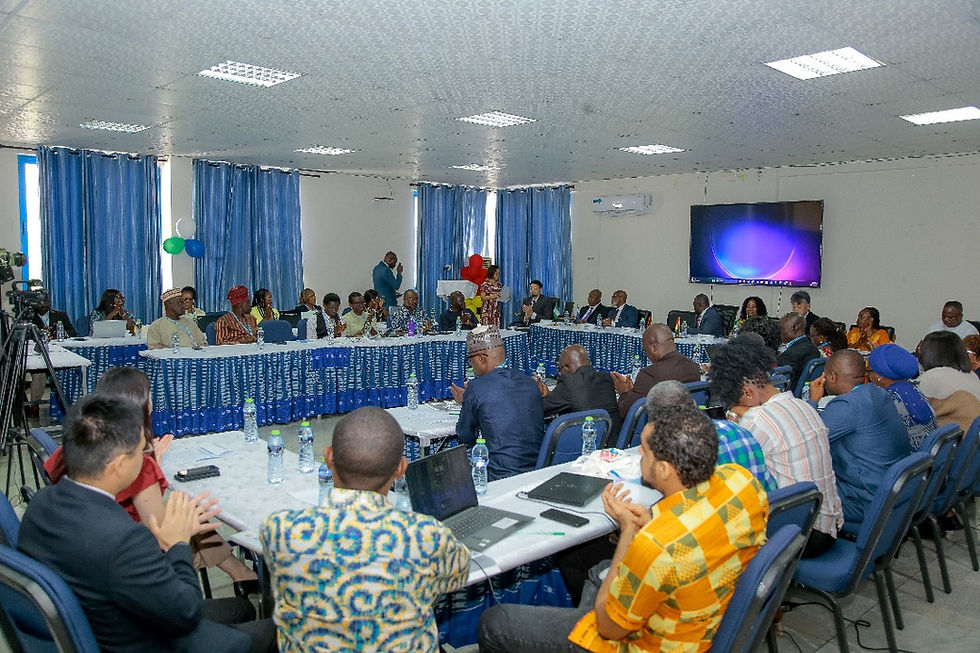Ghana to establish neutral infrastructure company for 5G network deployment
- Think News Online

- May 30, 2024
- 3 min read

In a strategic move to advance Ghana's telecommunications sector, the Minister of Communications and Digitalization, Ursula Owusu-Ekuful, announced plans to establish a neutral infrastructure company dedicated to delivering 5G services across the country.
Addressing journalists in Accra, the Minister explained the rationale behind this innovative approach and highlighted the government's commitment to inclusive and rapid digital transformation.
"Our government should make a decision that we would use a neutral infrastructure company to deliver this service," Owusu-Ekuful said.
"There is no existing neutral infrastructure company at the moment, so it has to be specifically formed for the purpose of delivering this service, based on the strategic policy decision of the government."
The Minister underscored that this decision was informed by past experiences and aimed at ensuring equitable access to telecommunications services across Ghana.
Unlike previous auctions that limited infrastructure ownership to a few entities, this initiative seeks to accelerate the deployment of 4G and 5G technologies to reach a broader population.
"The Finance Minister would have been happy if we had sold it off at auction, collected our money, and moved on, without caring what impact it would have on the sector," she noted.
"Unfortunately for the finance minister, we in the Ministry of Communications care about the impact of decision-making on the growth of the sector."
With 4G introduced in 2015 and only 15% penetration to date, Owusu-Ekuful emphasized the need for a different approach to avoid similar slow uptake with 5G.
The new neutral infrastructure company, NGIC (National Ghana Infrastructure Company), will be key to achieving this goal, ensuring faster, wider-reaching deployment of high-speed networks.
"Key partners in the NGIC consortium include Accent Digital Solutions and KNEX, both experienced in managing shared infrastructure. Accent Digital Solutions, along with two Chinese partners, has been instrumental in setting up rural telecom networks, while KNEX operates a shared digital terrestrial broadcasting platform"
She added that these companies bring valuable expertise and human capital to the consortium.
"Every mobile network operator operating in this country has been invited to be part of the consortium," Owusu-Ekuful announced, ensuring no operator is excluded.
The government will retain a small percentage in the consortium, while private investors are also welcomed to participate.
Drawing from successful models in countries like Malaysia, Germany, and the United States, Ghana's shared network infrastructure is designed to reduce investment pressures on incumbent Mobile Network Operators (MNOs) while delivering top-tier 5G services.
The deployment will incorporate Open Radio Access Network (Open RAN) technology, a first for Ghana, providing a scalable and cost-effective solution.
"The consortium will look for its own funding," the Minister said, with initial deployment costs estimated around $200 million.
The robust legal and regulatory framework in Ghana will support this ambitious rollout, ensuring it meets the highest standards.
The rollout plan aims to expand 4G coverage from the current 15% to 80% within three years, a record achievement for the continent.
The benefits of 5G technology, including faster speeds, lower latency, and increased reliability, are expected to transform industries, enable new business models, and drive economic growth.
"This initiative is a significant step towards achieving a fully digitalized Ghana by 2030," Owusu-Ekuful concluded.
"Our proactive approach and commitment to innovation have positioned us as a leader in digital transformation in Africa."
The establishment of NGIC marks a pivotal moment in Ghana’s digital journey, promising to enhance connectivity, spur innovation, and improve the quality of life for all Ghanaians.
Story by: Joshua Kwabena Smith








Comments